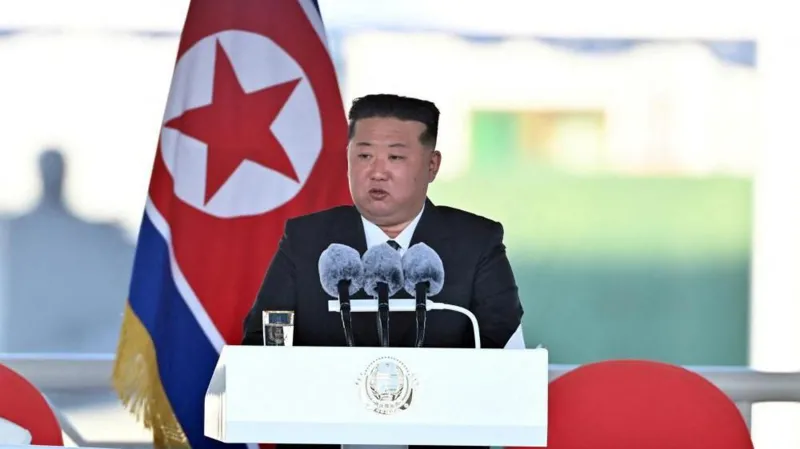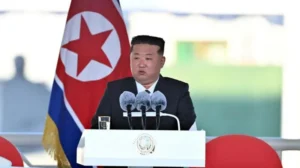Kim Jong Un Condemns ‘Serious Accident’ at North Korean Warship Launch
Incident Location & Context
Incident SiteChinaSouth KoreaNORTH KOREANaval Incident LocationWarship Launch SiteNaval Facility
Key Developments
- Rare Public Admission: Kim Jong Un publicly acknowledged a “serious accident” during warship launch
- Official Criticism: North Korean leader criticized officials responsible for the incident
- Military Implications: Incident raises questions about DPRK naval capabilities and safety protocols
- International Attention: Unusual transparency from typically secretive regime draws global focus
- Internal Accountability: Suggests increased emphasis on responsibility within military hierarchy
What We Know About the Incident
Official Statements and Reports
According to reports from North Korean state media, Kim Jong Un expressed “serious concern” over the incident that occurred during what was supposed to be a routine warship launch ceremony. The North Korean leader reportedly called the accident “unacceptable” and demanded a thorough investigation into the circumstances that led to the mishap.
While specific details about the nature of the accident remain limited, sources suggest the incident involved technical failures during the launch process. This marks one of the few instances where North Korean leadership has publicly acknowledged problems within their military operations, typically kept under strict secrecy.
Timeline of Events
Analysis and Implications
Military Significance
The incident highlights potential challenges in North Korea’s naval modernization efforts. Warship launches are complex operations requiring precise coordination, and failures can indicate broader issues with technical capabilities or training protocols within the Korean People’s Navy.
Political Implications
Kim Jong Un’s public criticism of officials represents a calculated political move, demonstrating leadership accountability while maintaining regime authority. This approach allows the leadership to address failures without appearing weak to domestic or international audiences.
Transparency Shift
The acknowledgment of this incident marks a departure from North Korea’s typical secrecy regarding military matters. This could signal a strategic shift toward limited transparency when controlling the narrative serves regime interests.
Regional Impact
Regional neighbors, particularly South Korea and Japan, will closely monitor this development for insights into North Korean military capabilities and internal dynamics. The incident may influence regional security assessments and diplomatic approaches.
Expert Perspectives
Military Analyst Viewpoints
Defense experts suggest that while the specific nature of the accident remains unclear, such incidents during high-profile military events can have significant implications for morale and international perception. The fact that Kim Jong Un chose to address the matter publicly indicates the seriousness with which the leadership views the incident.
Former intelligence officials note that North Korea’s acknowledgment of the accident, while rare, follows a pattern of selective transparency when the regime believes it can control the narrative and demonstrate accountability without compromising national security or leadership authority.
Regional Security Implications
The incident comes at a time when North Korea has been actively developing its naval capabilities, including submarine programs and coastal defense systems. Any setbacks in these programs could impact the country’s broader military modernization efforts and regional deterrence strategy.
International Response
While international reactions have been measured, intelligence agencies in neighboring countries are likely analyzing the incident for insights into North Korean military capabilities and internal dynamics. The rare public acknowledgment provides a unique window into typically opaque military operations.
Historical Context
Previous Military Incidents
North Korea has historically maintained strict secrecy around military operations, making public acknowledgments of incidents extremely rare. When such admissions do occur, they typically serve specific political or strategic purposes, often demonstrating leadership accountability while maintaining overall regime authority.
The last significant public acknowledgment of a military-related incident occurred several years ago, making this recent statement particularly noteworthy for analysts and regional security experts tracking North Korean military developments.
Naval Modernization Efforts
North Korea has been investing in naval capabilities as part of broader military modernization efforts. This includes development of submarines, coastal defense systems, and surface vessels designed to enhance the country’s maritime defense and power projection capabilities in regional waters.
Looking Forward
Potential Consequences
The aftermath of this incident will likely include internal reviews of safety protocols and operational procedures within North Korea’s naval forces. Kim Jong Un’s public criticism suggests that personnel changes and procedural reforms may follow as the leadership seeks to prevent similar incidents.
From an international perspective, this incident provides valuable insights into North Korean military operations and internal accountability mechanisms, information that regional powers and international observers will incorporate into their assessments of DPRK capabilities and intentions.
Regional Monitoring
Intelligence agencies and military analysts in South Korea, Japan, and the United States will continue monitoring North Korean naval activities for signs of procedural changes or capability adjustments following this incident. Such monitoring is crucial for understanding the evolving nature of regional security dynamics.



Leave a Reply